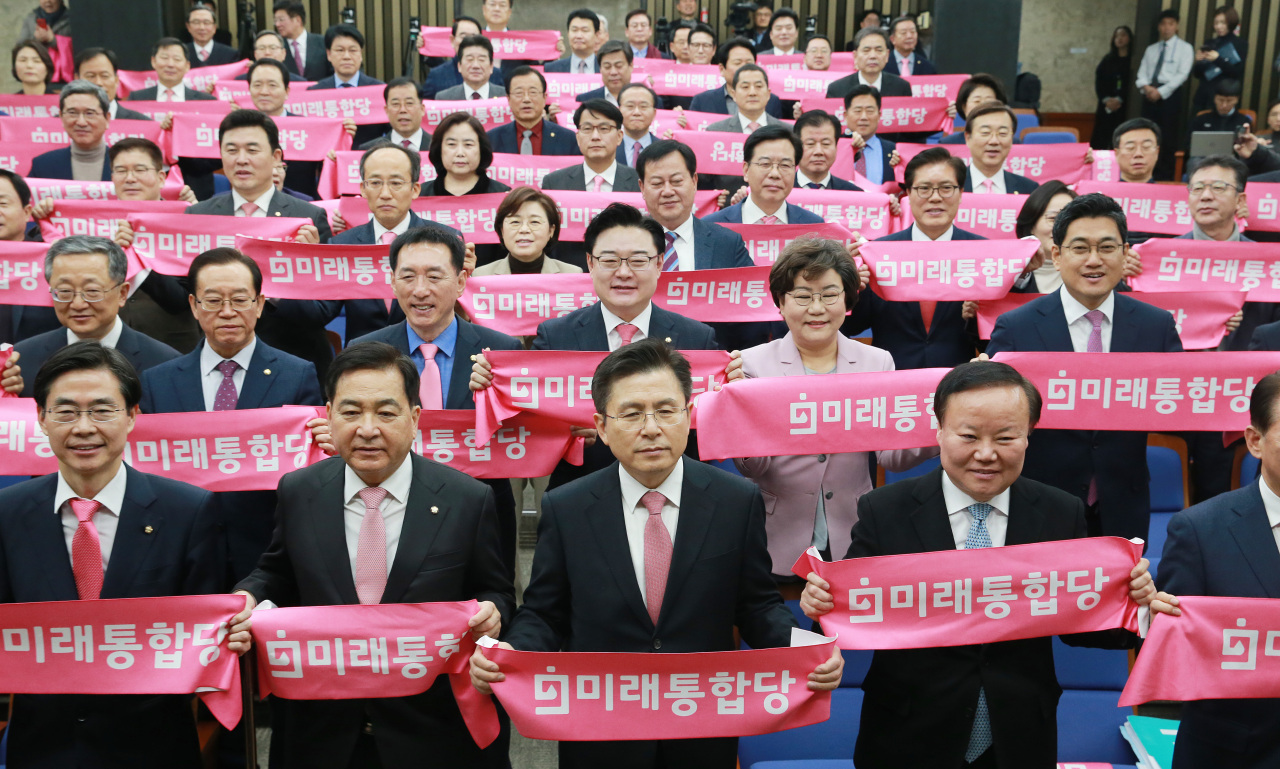 |
Chairman Hwang Kyo-han (center) and lawmakers of the new Party for Future Integration hold pink banners at the National Assembly in Seoul on Tuesday. Pink is the party’s official color for the April elections. (Yonhap) |
After three years of disarray, conservatives managed to forge a united front to counter the main liberal force of the ruling party, boosting their chances in the upcoming general elections.
The question, however, remains. Will the newly formed Party for Future Integration be able to recruit new talent and extend its support base beyond diehard conservative voters?
The new bloc was born Monday through the merger of the largest opposition Liberty Korea Party, the New Conservative Party and Onward for Future 4.0. The coalition marks the first since the Saenuri Party was dissolved in January 2017, as former President Park Geun-hye was ousted due to a corruption scandal.
The merger will empower the bloc, as the new party has 113 seats in the currently 295-member National Assembly.
At its official launch event Monday, the Party for Future Integration leaders stressed the need for innovation and future-oriented standards to depart from the past mistakes.
“We need to show that with our candidate selection and with our party leadership,” said Won hee-ryong, a Supreme Council member of the party.
But critics say the new group appears to be another replica of the Saenuri Party, as it has not presented a new vision or new politicians who can attract voters outside the typical conservative spectrum.
In apparent response to the criticism, the party’s Chairman Hwang Kyo-ahn praised a number of senior incumbent lawmakers of the Liberty Korea Party who decided to not to run for reelection.
“The beautiful and courageous decision made by many lawmakers to not seek reelection will lead our party to a bright future.” Hwang said during the first general meeting of the party Tuesday.
On Tuesday, 19 incumbent lawmakers of the Liberty Korea Party announced they would not run for the April 15 general elections for the 21st National Assembly.
His move also appears to put pressure on incumbent lawmakers representing Daegu and North Gyeongsang Province, the traditional conservative stronghold.
The Party for Future Integration announced its recruitment of Yoon Hee-suk, a professor at the state-run Korea Development Institute, and Lee Soo-hee, an attorney at law firm Hanbyol, on Tuesday.
By Park Han-na (
hnpark@heraldcorp.com)





![[Exclusive] Hyundai Mobis eyes closer ties with BYD](http://res.heraldm.com/phpwas/restmb_idxmake.php?idx=644&simg=/content/image/2024/11/25/20241125050044_0.jpg)
![[Herald Review] 'Gangnam B-Side' combines social realism with masterful suspense, performance](http://res.heraldm.com/phpwas/restmb_idxmake.php?idx=644&simg=/content/image/2024/11/25/20241125050072_0.jpg)

